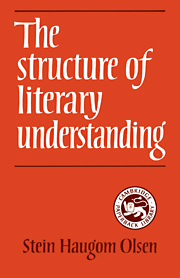Book contents
5 - THE VALIDATION OF INTERPRETATIVE CONCLUSIONS
Published online by Cambridge University Press: 30 September 2009
Summary
Introduction
When an author produces a literary work, he produces a text with the intention that the receiver should attribute to him the intention that he (the author) wanted the reader to look at it employing such conventions and concepts as were described in the last chapter. To deal with a text as a literary work the reader need not attribute any further intentions to the author, for example intentions concerning the ‘meaning’ of a work. It is one of the rules of the game that the literary work is autonomous in the sense that the understanding of it is independent of the author's interpretation of his own production. The author's literary intentions are expressed in the work. Statements from the author about the ‘meaning’ of a work have the same status as a reader's statements about the work. Both types of statement are interpretations: both are subject to independent verification by the same method. The author decides what his literary intentions are by making the literary work; and since he is the only one who can say what the final shape of the work should be, he has a special authority concerning this question of literary intention. His claim that a certain text is the final work is not open to challenge, for there is no meaningful way of interpreting ‘final’ except by taking as final what the author says. However, the author possesses no such special authority when it comes to interpreting his own literary intentions. He may not even be aware of their possible interpretation. It is not the case that criteria for good interpretations need refer to the author's interpretation of his own work.
- Type
- Chapter
- Information
- The Structure of Literary Understanding , pp. 118 - 159Publisher: Cambridge University PressPrint publication year: 1978



